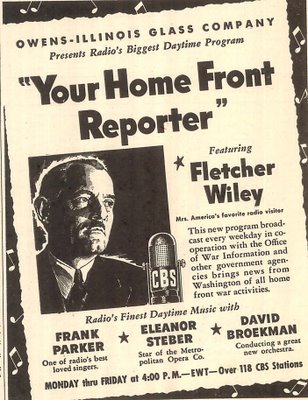
Monday Glamour Starter --- Jean Harlow --- Part One
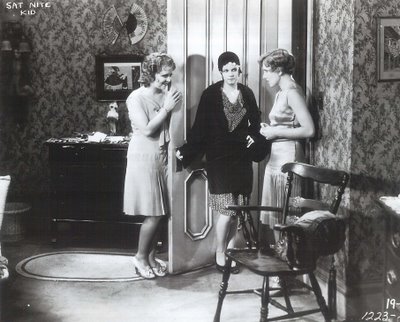
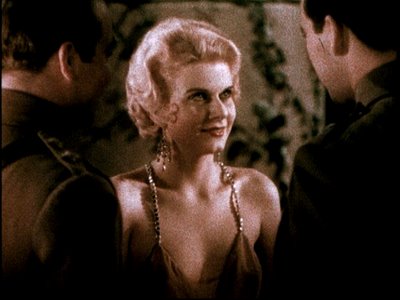 Jean Harlow scares me when she shouts, and she shouts a lot. People have said Red-Headed Woman is a funny movie. I'm not one of them. To my mind, it’s the Fatal Attraction of the thirties. Harlow yells in Wallace Beery’s face throughout Dinner At Eight, and cheats on him besides with poor Edmund Lowe, whom she also berates. She’s up more decibels in Bombshell, and later stalks Gable in China Seas. When she crashes Spencer Tracy’s Libeled Lady office in her wedding gown, he and we are reaching for the earmuffs. None of this enhances her sex goddess standing in my mind, and though tastes vary, I wouldn’t recommend her to guys with low thresholds for assertive women. The fact she was anything but this sort offscreen adds to her legacy’s paradox, but how many actresses can boast of a husband allegedly committing suicide because he couldn’t satisfy her? The platinum hook cleared peroxide bottles off many a pharmacy counter, but when did a star hopeful last employ this gimmick? Mamie Van Doren, perhaps? If anything, it distances us from Harlow today. There’s something ghostly about that chalk white hair, with a pallor suggesting imminent collapse. Is it just our advantage in hindsight knowing how tragically things would turn out? Harlow had misfortune of coming up during final plague years before modern medicine developed treatments so easily applied to her maladies today. But for absence of antibiotics, dialysis, and transplants, she might still be with us, a venerable icon of Hollywood’s Golden Age at ninety-five. I realize I’m outside a mainstream for thinking Harlow’s early work her best. Andrew Sarris talks about inept line readings and an unconvincing British accent in Hell’s Angels. For my money, this is where she fully justifies the sex label. Her delivery is certainly no worse, and maybe a little better, than many celebrated names from early talkers, but who at Metro encouraged Harlow to crank up volume once she got there? Her neophyte performances are more relaxed and appealing to these tired old eyes.
Jean Harlow scares me when she shouts, and she shouts a lot. People have said Red-Headed Woman is a funny movie. I'm not one of them. To my mind, it’s the Fatal Attraction of the thirties. Harlow yells in Wallace Beery’s face throughout Dinner At Eight, and cheats on him besides with poor Edmund Lowe, whom she also berates. She’s up more decibels in Bombshell, and later stalks Gable in China Seas. When she crashes Spencer Tracy’s Libeled Lady office in her wedding gown, he and we are reaching for the earmuffs. None of this enhances her sex goddess standing in my mind, and though tastes vary, I wouldn’t recommend her to guys with low thresholds for assertive women. The fact she was anything but this sort offscreen adds to her legacy’s paradox, but how many actresses can boast of a husband allegedly committing suicide because he couldn’t satisfy her? The platinum hook cleared peroxide bottles off many a pharmacy counter, but when did a star hopeful last employ this gimmick? Mamie Van Doren, perhaps? If anything, it distances us from Harlow today. There’s something ghostly about that chalk white hair, with a pallor suggesting imminent collapse. Is it just our advantage in hindsight knowing how tragically things would turn out? Harlow had misfortune of coming up during final plague years before modern medicine developed treatments so easily applied to her maladies today. But for absence of antibiotics, dialysis, and transplants, she might still be with us, a venerable icon of Hollywood’s Golden Age at ninety-five. I realize I’m outside a mainstream for thinking Harlow’s early work her best. Andrew Sarris talks about inept line readings and an unconvincing British accent in Hell’s Angels. For my money, this is where she fully justifies the sex label. Her delivery is certainly no worse, and maybe a little better, than many celebrated names from early talkers, but who at Metro encouraged Harlow to crank up volume once she got there? Her neophyte performances are more relaxed and appealing to these tired old eyes.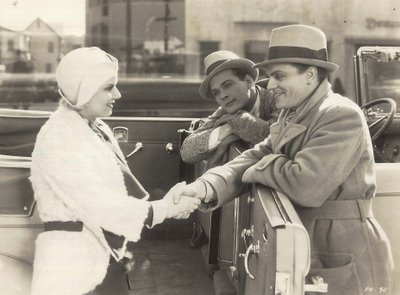
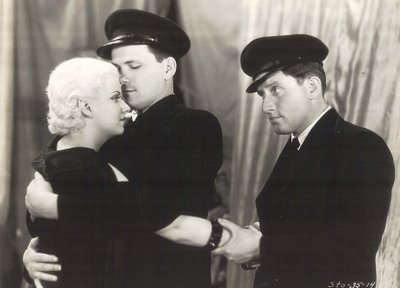
You’d never think she came from money, but Jean rode many a pony cart in youth, being apple of a privileged family’s eye. She contracted scarlet fever at summer camp (age fifteen), fate thereby sealed for kidney disease initiating a ten-year plan that would go undiagnosed until progress was way beyond reversal. Career beginning during silents to sound transition found her amidst extra ranks, with occasional rewarding bit. One look at Double Whoopee in 1929 and you knew she'd go places. Clara Bow recognized Harlow's new line of It even as her own approached decline. Mere background in The Saturday Night Kid, JH yet commanded attention on primitive sound stages, even as movies weren’t yet equipped to best exploit her. The Hell’s Angels momentum seemed likely to stall for uncertain years Howard Hughes had her contract. Imagine a sensational debut followed by months of forced idleness. Hughes had neither time to develop her, nor inclination to let others do so. Profitable (for H.H.) loan-outs put Harlow in two MGM law/order pics, The Secret Six and Beast Of The City, both red meat thrillers, particularly Beast, and Jean's hair photographed strikingly. Too bad in a long run, however, as barbaric rituals necessary to maintain such unnatural look poisoned her scalp via horrific combination of peroxide, ammonia, Clorox, and Lux flakes, these applied during weekly torture sessions at hands of inaptly named "beauticians." Again I’m at odds with Sarris about another of her loaners, Columbia’s Platinum Blonde. If this is a stiff and stilted performance, then he and I differ at the least in taste for precode thesping . Frank Capra understood well Harlow's sex lure --- who'd not succumb so readily as lead man Robert Williams here? (a Lee Tracy variant, more subdued --- tragic he died so young). Hughes finally sold JH to Metro, opening doors for studied merchandising she’d needed all along. If you watch their first starring vehicle, Red-Headed Woman, from her character’s point-of-view, it’s a pre-code sex romp worthy of outlaw reputation, but through Chester Morris’ beleaguered eyes, the thing plays like Olivier’s Carrie ordeal, Jean a frightful harpy a frightful to Jennifer Jones’ softer temptation. Writer Anita Loos must have felt those men had it coming, for they sure bear brunt of Harlow’s malevolent gold-digging here.

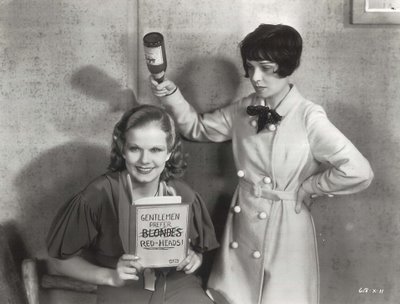

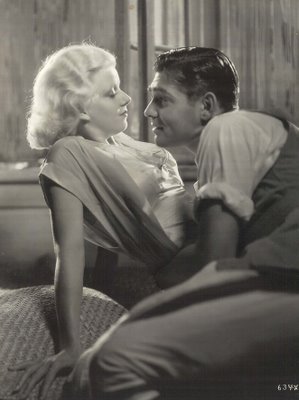
The suicide of second husband Paul Bern was either the worst calamity, or best break, Harlow ever got, depending on personal/professional viewpoint. Marrying this guy, even for career boosting promised, was adjudged sheer lunacy by those knowing both parties, Bern a still water running uneasily deep. Water got murkier when a secret common-law wife emerged. The husband's seemingly non-existent libido mystified further in light of fact he'd married an industry's leading sex goddess. Clear enough what Harlow expected of him, but what in deuce did he want with her? The ultimate trophy bride, perhaps, but Bern made no move to consummate this union, and insider talk got rampant. David Stenn’s definitive biography says the former "wife" crashed gates one night and confronted the couple. Scandal thus promised left Bern no alternative but to press gun to temple and fire, Harlow said by some to have been downstairs. A note left behind fit nicely with the Byzantine cover story Metro publicists cooked during hours ruminating over the bloody corpse prior to alerting police. Jean was packaged as unknowing siren for whom this impotent parody of manhood crashed upon rocks over that terrible wrong he’d done her (the cryptic note ignited public imagination by referring to a previous night's events as only a comedy). Anxious days followed, but Harlow’s public stood fast, her standing actually enhanced in the aftermath. A pre-code peak was achieved with soon completed Red Dust, one of a handful of titles best able to convey to modern audiences what fuss among Forbidden Hollywood devotees is all about.
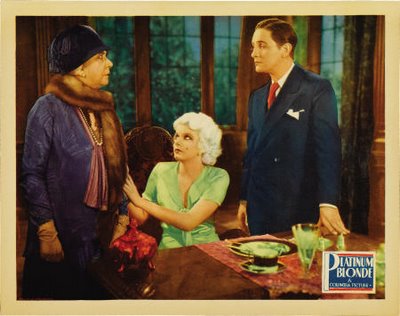
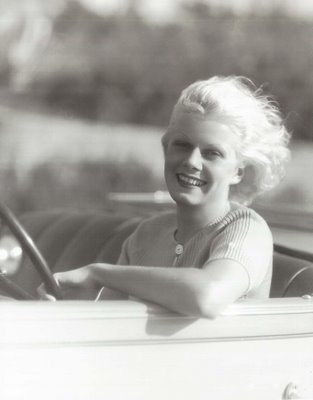
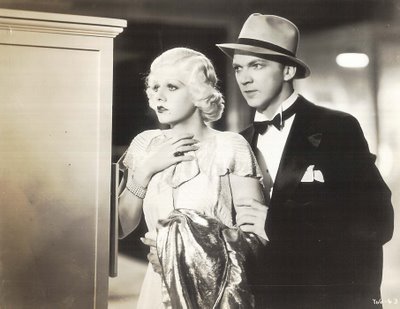
Harlow’s ascendancy to stardom was firmly acknowledged by the Bombshell title casting and her character's identification as biggest name on the fictional Monarch lot. It took a player with real stature to be assigned a plum like this --- Harlow had indeed arrived. A tendency to brass things over the top begins to reveal itself here. Bombshell is less funny than frantic, and though Harlow’s effective at the lower registers, she’s too often drawn into rat-a-tat competition with seasoned co-stars Lee Tracy and Pat O’ Brien. When it comes to this kind of accelerated dialogue, she’s just not in their league. I hadn't mentioned the dominating hell-spawn of a mother that bled Jean white as her fabled hair. Mama Jean was universally despised among Harlow husbands, both actual and intended. Several marriages went on the shoals as a direct result of her meddling. Maniacally possessive, she was herself possessed by a gigolo scoundrel who curried favor with gangland overlords and introduced Jean into bad company. In this, the daughter’s judgment was no less impaired than the mother’s, as witness a romance of some duration with one Abner Zwillman, a mob confederate of notorious "Bugsy" Siegel. Prizefighter Max Baer was another conquest. His wife was all set to name Jean as co-respondent in her divorce action, until Metro got busy and arranged for Jean to propose marriage to a shocked and delighted Harold Rosson, her favorite studio cameraman. Hal must have thought he’d fallen into that proverbial field of four-leaf clovers, but their marriage lasted not even a year. Pretty cynical arrangement, and it would appear she was, at least on this occasion, less a passive victim than a willing participant in such studio machinations. Drat such nuance when we’re casting our rose-tinted romances of celluloid, but Harlow, like anyone in the business, did what it took to remain on top. She’d not be half so interesting otherwise. Whatever the compromises, Harlow didn’t have coming what happened to her within a few short years. Of all the exits any star ever took, this had to be one of the roughest.
Photo Captions
Jean Harlow with Laurel and Hardy in Double Whoopee
With Clara Bow and Jean Arthur in The Saturday Night Kid
In the Two-Color Technicolor sequence from Hell's Angels
With Edward Woods and James Cagney in The Public Enemy
With Warren Hymer and Spencer Tracy in Goldie
Color-Tinted Portrait Courtesy Tom Maroudas of Dream Pin-Ups
With Anita Loos on the set of Red-Headed Woman
With husband Paul Bern
Lobby Card from Platinum Blonde
MGM Publicity Photo
With Lee Tracy in Bombshell
